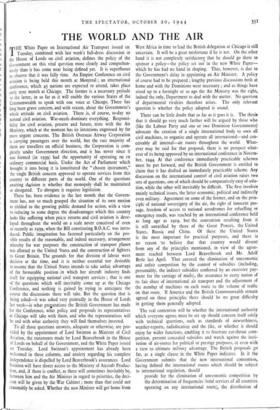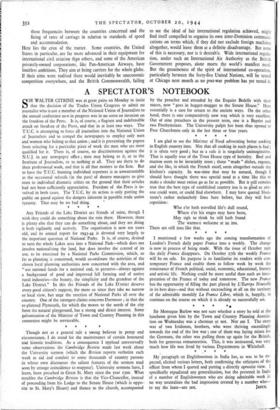THE WORLD AND THE AIR
THE White Paper on International Air Transport issued on Tuesday, combined with last week's full-dress discussion in the House of Lords on civil aviation, defines the policy of the Government on this vital question more clearly and comprehen- sively than it has come near being defined yet. It is superfluous to observe that it was fully time. An Empire Conference on civil aviation is being held this month at Montreal ; an international conference, which 45 nations are expected to attend, takes place early next month at Chicago. The former is a necessary prelude to the latter, in so far as it will enable the various States of the Commonwealth to speak with one voice at Chicago. There has long been grave concern, and with reason, about the Government's whole attitude on civil aviation. There is, of course, to-day no normal civil aviation. War-needs dominate everything. Responsi- bility for civil aviation, present and future, rests with the Air Ministry, which at the moment has its intentions engrossed by far more urgent concerns. The British Overseas Airway Corporation is carrying passengers over the world, but the vast majority of them are travellers on official business, the Corporation is com- pletely under Government direction, and it has never since it was formed (in 1939) had the opportunity of operating on an ordinary commercial basis. Under the Act of Parliament which brought it into being it is constituted the " chosen instrument," the single British concern approved to operate services from this country to different parts of the world. One of the questions awaiting dwision is whether that monopoly shall be maintained or abrogated. To abrogate it requires legislation.
There has been evidence in the last month that the Govern- ment has, not so much grasped the situation of its own motion as yielded to the growing public demand for action, with a view to reducing to some degree the disadvantages which this country looks like suffering when peaze returns and civil aviation is deve- loped throughout the world on a scale never conceived of even so recently as 1939, when the Bill constituting B.O.A.C. was intro- duced. Public imagination has fastened particularly on the pos- sible results of the reasonable, and indeed necessary, arrangement whereby for war purposes the construction of transport planes was allotted to the United States and the construction of fighters to Great Britain. The grounds for that division of labour were decisive at the time, and it is neither essential nor desirable to assume that the United States intends to take unfair advantage of the favourable position . in which her aircraft industry finds itself for equipping national civil transport services ; that is one of the questions which will inevitably come up at the Chicago Conference, and nothing is gained by trying to anticipate the course the discussions there will take. But the question that is being asked—it was asked very pointedly in the House of Lords last week—is what preilarations the British Government has made for the Conference, what policy and proposals its representatives at Chicago will take with them, and who the representatives will be and with what authority they will find themselves invested.
To all those questions answers, adequate or otherwise, are pro- vided by the appointment of Lord Swinton as Minister of Civil Aviation, the statements made by Lord Beaverbrook in the House of Lords on behalf of the Government, and the White Paper issued on Tuesday. Lord Swinton's appointment has already been welcomed in these columns, and anxiety regarding his complete independence is dispelled by Lord Beaverbrook's assurances. Lord Swinton will have direct access to the Ministry of Aircraft Produc- tion, and, if there is conflict, as there will sometimes inevitably be, between him and the Air Minister in regard to priorities, the deci- sion will be given by the War Cabinet ; more than that could not reasonably be asked. Whether the new Minister will get home from West Africa in time to lead the British delegation at Chicago is still uncertain. It will be a great misfortune if he is not. On the other hand it is not completely satisfactory that he should go there to sponsor a policy—the policy set out in the new White Paper— which he has had no hand in shaping. That, however, is due to the Government's delay in appointing an Air Minister. A policy Of course had to be prepared ; lengthy previous discussions both at home and with the Dominions were necessary ; and as things have stood up to a fortnight or so ago the Air Ministry was the right, indeed the only, Department to deal with the matter. No question of departmental rivalries therefore arises. The only relevant question is whether the policy adopted is sound.
There can be little doubt that so far as it goes it is. The thesis that it should go very much farther will be argued by those who (like the Labour Party and one or' two Dominion Governments) advocate the creation of a single international body to own all civil machines, to organise and operate all international—and con- ceivably all internal—air routes throughout the world. What- ever may be said for that proposal, there is no prospect what- ever of its being approved by an international conference in Novem- ber, 1944. At that conference immediately practicable schemes must be put forward, and the British Government is entitled to claim that it has drafted an immediately practicable scheme. Any discussion on the international control of civil aviation raises two sets of questions, one of which should be comparatively easy of solu- tion, while the other will inevitably be difficult. The first involves mainly technical issues, the latter economic, political and indirectly even military. Agreement on some of the former, and on the prin- ciple of national sovereignty of the air, the right of innocent pas- sage, freedom of access to national aerodromes for refuelling or emergency needs, was reached by an international conference held as long ago as 5919, but the convention resulting from it is still unratified by three of the Great Powers, the United States, Russia and China. Of these the United States is the most important for practical purposes, and there is no reason to believe that that country would dissent from any of the principles mentioned, in view of the agree- ment reached between Lord Beaverbrook and Mr. Adolf Berle last April. That covered the elimination of uneconomic and unfair competition by the control of subsidies (including, presumably, the indirect subsidies conferred by an excessive pay- ment for the carriage of mails), the assurance to every nation of its fair share of international air transport and the adjustment of the number of machines on each route to the volume of traffic on that route. If America and the British Commonwealth remain agreed on these principles there should be no great difficulty in getting them generally adopted.
The real contention will be whether the international authority which everyone agrees must be set up should concern itself solely with technical questions, such as standards of airworthiness, weather-reports, radiolocation and the like, or whether it should enjoy far wider functions, enabling it to frustrate cut-throat com- petition, prevent concealed subsidies and watch against the insti- tution of air-routes for political or prestige purposes, er even with a view to ultimate military advantage. The British proposals go far, as a single clause in the White Paper indicates. In it the Government submits that the new international convention, having defined the international routes which should be subject to international regulation, should provide for the elimination of uneconomic competition by the determination of frequencies (total services of all countries operating on any international route), the distribution of those frequencies between the countries concerned and the fixing of rates of carriage in relation to standards of speed and accommodation.
Here lies the crux of the matter. Some countries, the United States in particular, are far more advanced in their equipment for international civil aviation than others, and some of the American privately-owned corporations, like Pan-American Airways, have limitless ambitions. They aim at being carriers for the whole globe. If their aims were realised there would inevitably be uneconomic competition everywhere, and the British Commonwealth, failing to see the ideal of fair international regulation achieved, might find itself compelled to organise its own inter-Dominion communi- cations on terms which, if they did not exclude foreign machines altogether, would leave them at a definite disadvantage. But none of this is necessary, nor is it desirable. Wide international regula- tion, under such an International Air Authority as the. British Government proposes, alone meets the world's manifest need. But the genuineness of the spirit of international co-operation. particularly between the forty-five United Nations, will be tested at Chicago next month as no post-war problem has yet tested it.



























 Previous page
Previous page